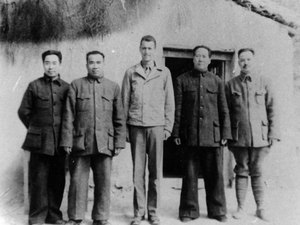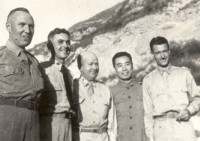Note: Our accounts contain the personal recollections and opinions of the individual interviewed. The views expressed should not be considered official statements of the U.S. government or the Association for Diplomatic Studies and Training. ADST conducts oral history interviews with retired U.S. diplomats, and uses their accounts to form narratives around specific events or concepts, in order to further the study of American diplomatic history and provide the historical perspective of those directly involved.
In 1944, John Service, Colonel David Barrett, and a small group of diplomats and military staff went to Yenan to learn more about the Chinese Communists and the community they set up there. Throughout their time there, the Communists wanted to know a lot about what was going outside of Yenan, especially in the United States. This account was compiled from an interview by ADST with John Service in 1977. You can read the entire account on ADST.org.
SERVICE: I would say that under the circumstances they were quite realistic. In some ways they had a fairly good understanding of the United States. They realized the effect of the political campaign coming on in the fall of '44, that this was not a time for Roosevelt to make commitments.  They said, "We realize this. We'll wait till after the campaign is over." After the campaign was over they wrote to Roosevelt and congratulated him. Roosevelt wrote back. It was quite a cordial letter.
They said, "We realize this. We'll wait till after the campaign is over." After the campaign was over they wrote to Roosevelt and congratulated him. Roosevelt wrote back. It was quite a cordial letter.
They were astounded at Truman's nomination, but then so were we all. I mean we were dumbfounded when it came over the news[...] We were having dinner that night with the leaders over at the army headquarters. Generally, I was regarded as the civilian leader and Barrett as the military leader. I was generally put at the table or place of honor with Mao Zedong, and Chu Teh gave Barrett the honors.
I could sense that Mao was very impatient to get through with all the folderol about getting into our places and getting seated. So, as soon as we sat down he came out with it. [loudly] "Who is this Too-Lu-Mun? Who is Too-Lu-Mun?" "Who is this man Truman?" [laughter] Most of the dinner was devoted then to trying to explain how it was possible that someone completely unknown, or almost completely unknown, no great record of war or political service, could suddenly be chosen Vice President.
[Henry] Wallace, of course, had been Vice President. Wallace had made a trip to China. Everyone assumed Wallace would be renamed. Chinese were worried that Wallace's visit to China had been what did him in, because it was during his visit that we got permission to go up to Yenan. They were concerned, what this meant, you know, about attitudes toward China, attitudes toward the Soviet Union. They could imagine all sorts of things into it, because they didn't have any comprehension of the domestic political situation in the United States. Well, we didn't know too much about it either. So we were sort of helpless. It was an amusing incident. Obviously Mao had given a hard time to Zhou En-lai, because they were quite relieved when they found we were about as confused as they were. [laughter]
